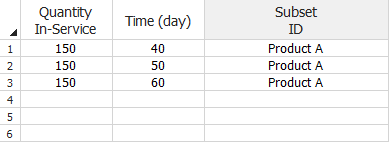Times-to-Failure Format
If your warranty claims data are already in terms of failure/suspension times, you can use the times-to-failure format to forecast future warranty returns.
Time Units
In the times-to-failure format, you can use any time units appropriate for your data by clicking the Change Units icon on the Main page of the folio's control panel.
![]()
This opens the Change Units window, which gives you a selection of units to use. The units that are available in the drop-down list are defined at the database level. When you select new units, the appropriate columns in the data sheet will be automatically configured for the units you selected, and the new unit will be displayed next to the results in the control panel.
Data Sheets
The times-to-failure format consists of two data sheets: Data and Future Sales.
In the data sheet:
Data entry is similar to entering data in a Weibull++ life data folio.
The Subset ID column is for logging any pertinent information or comments about the data. You can also use the Subset ID column to categorize subpopulations in your data set. You will be able to choose a distribution appropriate for each subset of data by selecting the Use Subsets option on the Main page of the control panel.
Note: The subset ID can be any text up to 30 characters, including spaces. For example, "A _ _ X" is not the same as "A _ X" where "_ " is used to designate a space.

In the Future Sales sheet:
The Quantity In-Service column is for recording the projected number of units to be sold. This information is used in the forecast analysis.
The Time column is for logging the anticipated manufacturing/sales/shipment period.
